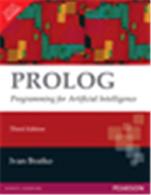PROLOG: Programming for Artificial Intelligence, 3/e

|
Author(s):
Author:
Ivan Bratko
- ISBN:9788131711347
- 10 Digit ISBN:813171134X
-
Price:Rs. 1390.00
- Pages:704
- Imprint:Pearson Education
- Binding:Paperback
- Status:Available
-
|
The third edition of this best-selling guide to Prolog and Artificial Intelligence has been updated to include key developments in the field while retaining its lucid approach to these topics. Prolog has its roots in logic, however the main aim of this book is to teach Prolog as a practical programming tool. This text therefore concentrates on the art of using the basic mechanisms of Prolog to solve interesting problems.
Table of Content
- The Prolog Language
- Introduction to Prolog
- Syntax and Meaning of Prolog Programs
- Lists, Operators, Arithmetic
- Using Structures: Example Programs
- Controlling Backtracking
- Input and Output
- More Built-in Predicates
- Programming Style and Techniques
- Operations on Data Structures
- Prolog in Artificial Intelligence
- Basic Problem-Solving Strategies
- Best-First Heuristic Search
- Problem Decomposition and AND/OR Graphics
- Constraint Logic Programming
- Knowledge Representation and Expert Systems
- An Expert System Shell
- Planning
- Machine Learning
- Inductive Logic Programming
- Qualitative Reasoning
- Language Processing with Grammar Rules
- Game Playing
- Meta-Programming
- About the Author
- Professor Ivan Bratko leads the AI groups in the Faculty of Computer and Information Science at both Ljubljana University and the Jozef Stefan Institute in Slovenia.
|
Salient Features
- Combined approach to Prolog and AI allows flexibility for learning and teaching
- Provides a thorough representation of AI, emphasizing practical techniques and Prolog implementations
- Prolog programs for use in projects and research are available for download on the World Wide Web.
- Constraint Logic Programming
- Qualitative Reasoning
- Inductive Logic Programming
- The addition of belief networks for handling uncertainty
- A major update on machine learning
- Additional techniques for improving Program efficiency
- Meta-programming is updated to show how Prolog can be used to implement other languages (including object-oriented programming)
- A new Companion Web site will contain further teaching materials and updates
|
|
|
|
|